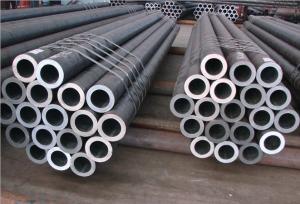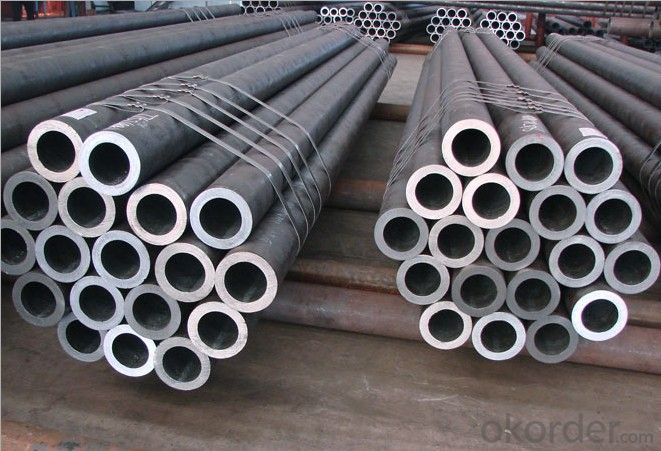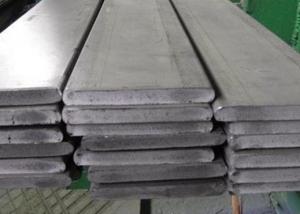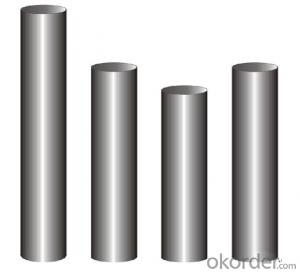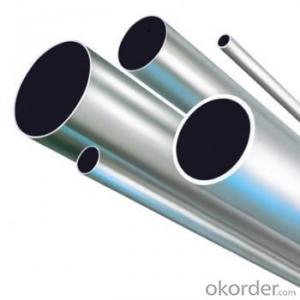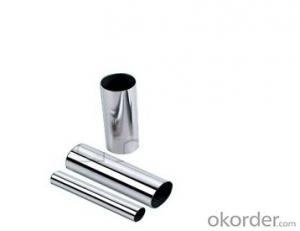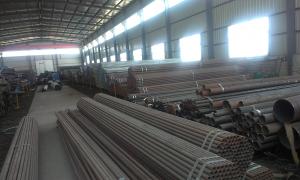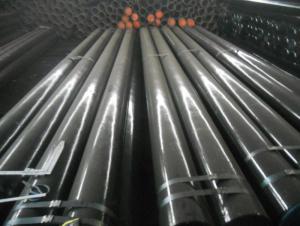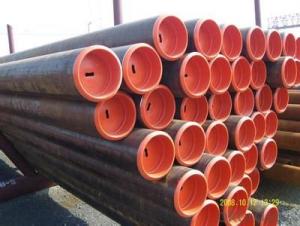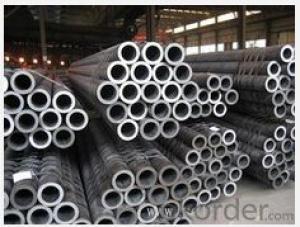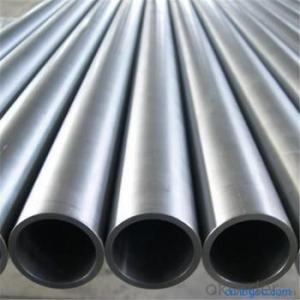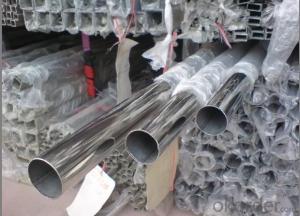Small Diameter Seamless Stainless Steel Tube
- Loading Port:
- Tianjin
- Payment Terms:
- TT or LC
- Min Order Qty:
- 25 m.t.
- Supply Capability:
- 10000 m.t./month
OKorder Service Pledge
OKorder Financial Service
You Might Also Like
We are company that have many years experience and professional manager team and engineer team and sales team, sure we will provide you high quality of pipe and professioanl service.
Seamless pipe possesses a hollow section and without seam around the strip steel. It is made with solid bar or steel ingot by perforating machine. As the facture process does not include any welding, seamless pipes are considered to be stronger and more durable. Generally speaking, seamless pipe has better pressure resistance and security than other classifications, and was usually more easily available than welded pipe.
2、Main Features of the Seamless Pipe:
• High working accuracy
• High strength
• Small inertia resistance
• Strong therming dissipine ability
• Good appearance
• Reasonble price
3、Seamless Pipe Specification:
Standard | GB, DIN, ASTM ASTM A106-2006, ASTM A53-2007 |
Grade | 10#-45#, 16Mn 10#, 20#, 45#, 16Mn |
Thickness | 8 - 33 mm |
Section Shape | Round |
Outer Diameter | 133 - 219 mm |
Place of Origin | Shandong, China (Mainland) |
Secondary Or Not | Non-secondary |
Application | Hydraulic Pipe |
Technique | Cold Drawn |
Certification | API |
Surface Treatment | factory state or painted black |
Special Pipe | API Pipe |
Alloy Or Not | Non-alloy |
Length | 5-12M |
Outer Diameter | 21.3-610mm |
Grade | 20#, 45#, Q345, API J55, API K55, API L80, API N80, API P110, A53B |
Standard | ASME, ASTM |
1) Material:20#(ASTM A 106/A53 GRB.API5LGRB,GB),45#,16Mn,10#.
2) Specification range: OD: 21.3-610mm, WT:6-70mm, length:6-12m or according to the requirement of clients.
3) Executive standards: GB, ASME API5L.ASTM A 106/A53,Despite of the above standards, we can also supply seamless steel pipe with standard of DIN, JIS, and so on, and also develop new products according to the requirements of our clients!
4) Surface: black lacquered, varnish coating or galvanized.
5) Ends: Beveled or square cut, plastic capped, painted.
6) Packing: bundles wrapped with strong steel strip, seaworthy packing.
4、Packaging & Delivery:
Packaging Details: | seaworthy package, bundles wrapped with strong steel strip |
Delivery Detail: | 15-30days after received 30%TT |
5、FAQ of Seamless Pipe:
①How is the quality of your products?
We have many years business experience in this area, and we have professional engineer and manager team and sure we can provide you high quality production and professional service.
②How about price?
Yes, we are factory and be able to give you lowest price below market one, and we have a policy that “ for saving time and absolutely honest business attitude, we quote as lowest as possible for any customer, and discount can be given according to quantity”,if you like bargain and factory price is not low enough as you think, just don’t waste your time.Please trust the quotation we would give you, it is professional one.
③Why should you chose us?
We can give you both.Additionally, we can also offer professional products inquiry, products knowledge train(for agents), smooth goods delivery, exellent customer solution proposals.Our service formula: good quality+good price+good service=customer’s trust
SGS test is available, customer inspection before shipping is welcome, third party inspection is no problem.
6、Seamless Pipe Images:
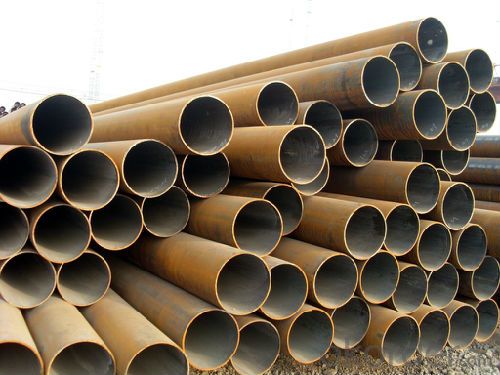
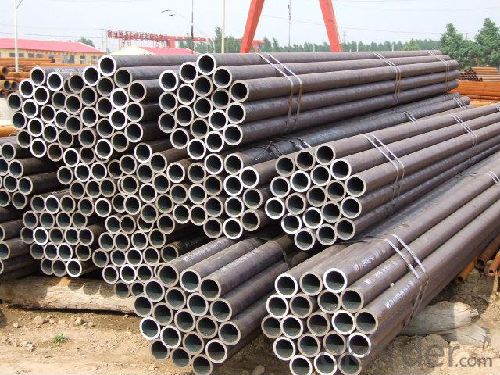
- Q: Can stainless steel pipes be used for air conditioning systems?
- Yes, stainless steel pipes can be used for air conditioning systems. Stainless steel is known for its corrosion resistance, durability, and ability to handle high temperatures, making it a suitable material for air conditioning systems. It helps maintain the quality of air and prevents contamination due to its non-reactive nature. Additionally, stainless steel pipes offer excellent mechanical strength and are resistant to damage caused by external factors such as moisture or chemicals.
- Q: Can stainless steel pipes be used for wastewater treatment systems?
- Indeed, wastewater treatment systems can make use of stainless steel pipes. Stainless steel, being an exceptionally durable and corrosion-resistant substance, proves to be an excellent selection for pipes situated in challenging surroundings like wastewater treatment facilities. These pipes are capable of enduring the corrosive attributes of wastewater, encompassing chemicals and varying pH levels. Furthermore, stainless steel pipes possess a sleek surface, which aids in reducing the buildup of waste and bacteria, thereby guaranteeing the smooth movement of wastewater within the system. Moreover, stainless steel can be effortlessly cleaned and maintained, making it a cost-efficient and trustworthy alternative for wastewater treatment systems.
- Q: Can stainless steel pipes be used for steam transportation?
- Yes, stainless steel pipes can be used for steam transportation. Stainless steel has excellent corrosion resistance and high temperature strength, making it suitable for carrying steam under high pressure and temperature conditions. The smooth surface of stainless steel pipes also reduces friction and minimizes the risk of clogging or scaling, ensuring efficient and reliable steam transportation. Additionally, stainless steel is a durable material that can withstand extreme conditions, making it a preferred choice for steam transportation in various industries such as power generation, chemical processing, and oil and gas.
- Q: How do you calculate the pressure drop in stainless steel pipes?
- To calculate the pressure drop in stainless steel pipes, you would need to consider various factors such as the flow rate, pipe diameter, pipe length, and the properties of the fluid being transported. The pressure drop can be determined using the Darcy-Weisbach equation, which is commonly used for calculating pressure losses in pipe systems. The Darcy-Weisbach equation is as follows: ΔP = (f * (L/D) * (ρ * V^2))/2 Where: ΔP = Pressure drop (in units of force per unit area, such as psi or Pa) f = Darcy friction factor (depends on flow conditions and pipe roughness) L = Pipe length (in units of length, such as meters or feet) D = Pipe diameter (in units of length, such as meters or feet) ρ = Fluid density (in units of mass per unit volume, such as kg/m^3 or lb/ft^3) V = Fluid velocity (in units of length per unit time, such as m/s or ft/s) To calculate the pressure drop, you would need to determine the Darcy friction factor, which depends on the Reynolds number (Re) and the relative roughness of the pipe. The Reynolds number can be calculated using the following equation: Re = (ρ * V * D)/μ Where: μ = Fluid viscosity (in units of force per unit area per unit time, such as Pa·s or lb/ft·s) Once you have determined the Reynolds number, you can use empirical correlations or Moody's chart to find the Darcy friction factor for the given flow conditions. With the friction factor, pipe length, diameter, fluid density, and velocity, you can then calculate the pressure drop using the Darcy-Weisbach equation. It is important to note that the above equations provide an approximate calculation of pressure drop in stainless steel pipes. The accuracy of the calculation may depend on factors such as pipe roughness, fluid properties, and the flow regime. Additionally, it is recommended to consult relevant standards or engineering references for more detailed and accurate calculations.
- Q: What is the difference between seamless and ERW stainless steel pipes?
- Seamless and ERW (Electric Resistance Welded) stainless steel pipes are two different types of pipes used in various applications. The main difference between these two types lies in their manufacturing process and physical characteristics. Seamless stainless steel pipes are manufactured without any welding seam. They are made by extruding a solid billet of stainless steel through a die to form the desired shape and size. This process ensures a smooth and uniform surface finish, with no weak points or potential areas for leakage. Seamless pipes are generally considered to have higher strength and pressure ratings, making them suitable for high-pressure applications such as oil and gas pipelines, refineries, and petrochemical plants. On the other hand, ERW stainless steel pipes are manufactured by rolling a strip of stainless steel into a tube shape and welding the edges together using a high-frequency electric current. This welding process creates a strong bond between the edges, resulting in a welded seam running along the length of the pipe. ERW pipes are more cost-effective compared to seamless pipes and are commonly used in applications where high pressure is not a major concern, such as plumbing, structural applications, and low-pressure fluid transport. In terms of physical characteristics, seamless pipes have a smoother interior surface, which allows for better flow properties and reduces the risk of corrosion or scaling. ERW pipes, due to the welding process, may have a slightly rougher interior surface, but this does not significantly impact their performance in most applications. It is important to consider the specific requirements of your project when choosing between seamless and ERW stainless steel pipes. Factors such as pressure ratings, corrosion resistance, cost, and intended use should all be taken into account to ensure the most suitable option is selected.
- Q: Are stainless steel pipes suitable for mining operations?
- Yes, stainless steel pipes are suitable for mining operations. They offer excellent durability, corrosion resistance, and high strength, making them ideal for transporting various materials and fluids in harsh mining environments. Stainless steel pipes can withstand extreme temperatures, pressure, and exposure to chemicals, ensuring reliable and long-lasting performance in mining operations.
- Q: Disadvantages of stainless steel tubes
- Stainless steel composite pipe and aluminum plastic composite pipe in the structure of almost, to some extent, the performance is also relatively close. Similarly, due to the strength of the steel, the construction process is still a problem.
- Q: Can stainless steel pipes be used for power generation?
- Yes, stainless steel pipes can be used for power generation. Stainless steel is widely used in power generation industries, especially in applications such as steam generation and distribution systems, as it offers excellent corrosion resistance, high temperature strength, and durability.
- Q: Difference between stainless steel and steel pipe
- Steel pipe according to the production method can be divided into two categories: seamless steel pipe and pipe joints, pipe joints as welded steel pipe.1. seamless steel tube according to the production methods can be divided into: hot-rolled seamless pipe, cold drawn tube, precision steel tube, heat expansion tube, cold spinning tube and extrusion tube.Seamless steel tubes are made of high quality carbon or alloy steel. They are hot-rolled and cold-rolled (drawn).
- Q: What is the difference between Schedule 5 and Schedule 10 stainless steel pipes?
- Schedule 5 and Schedule 10 stainless steel pipes find frequent use across various industries and applications, though they possess distinct dissimilarities. The primary disparity resides within their wall thickness. While Schedule 5 stainless steel pipes boast a slimmer wall thickness, Schedule 10 stainless steel pipes possess a thicker wall. Consequently, Schedule 5 pipes exhibit a greater internal diameter, facilitating a more substantial flow of fluids or gases through the conduit. On the contrary, Schedule 10 stainless steel pipes exhibit a reduced internal diameter due to their thicker walls. This renders them more suitable for applications necessitating higher pressure or strength, as the heightened wall thickness grants augmented durability and resistance against external forces. Moreover, the disparate wall thicknesses of Schedule 5 and Schedule 10 pipes influence their weight and cost. Owing to their thinner walls, Schedule 5 pipes weigh less and command a lower price than Schedule 10 pipes. Concerning availability, Schedule 10 stainless steel pipes witness more frequent usage in industrial processes involving high pressure or corrosive environments, such as chemical plants or oil refineries. Conversely, Schedule 5 stainless steel pipes are often employed in applications where the flow of fluids or gases does not encounter extreme pressure, such as plumbing or low-pressure conveying systems. In summary, the principal distinctions between Schedule 5 and Schedule 10 stainless steel pipes lie within their wall thickness, internal diameter, strength, weight, and cost. The choice between the two hinges upon the specific requirements of the application and the level of pressure or durability required.
Send your message to us
Small Diameter Seamless Stainless Steel Tube
- Loading Port:
- Tianjin
- Payment Terms:
- TT or LC
- Min Order Qty:
- 25 m.t.
- Supply Capability:
- 10000 m.t./month
OKorder Service Pledge
OKorder Financial Service
Similar products
Hot products
Hot Searches
Related keywords
